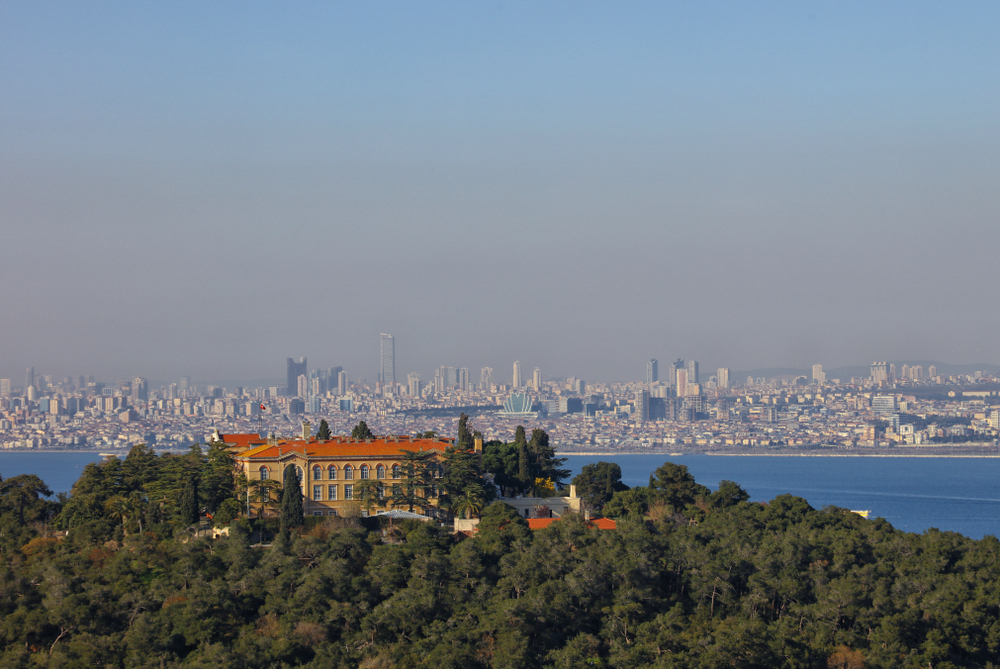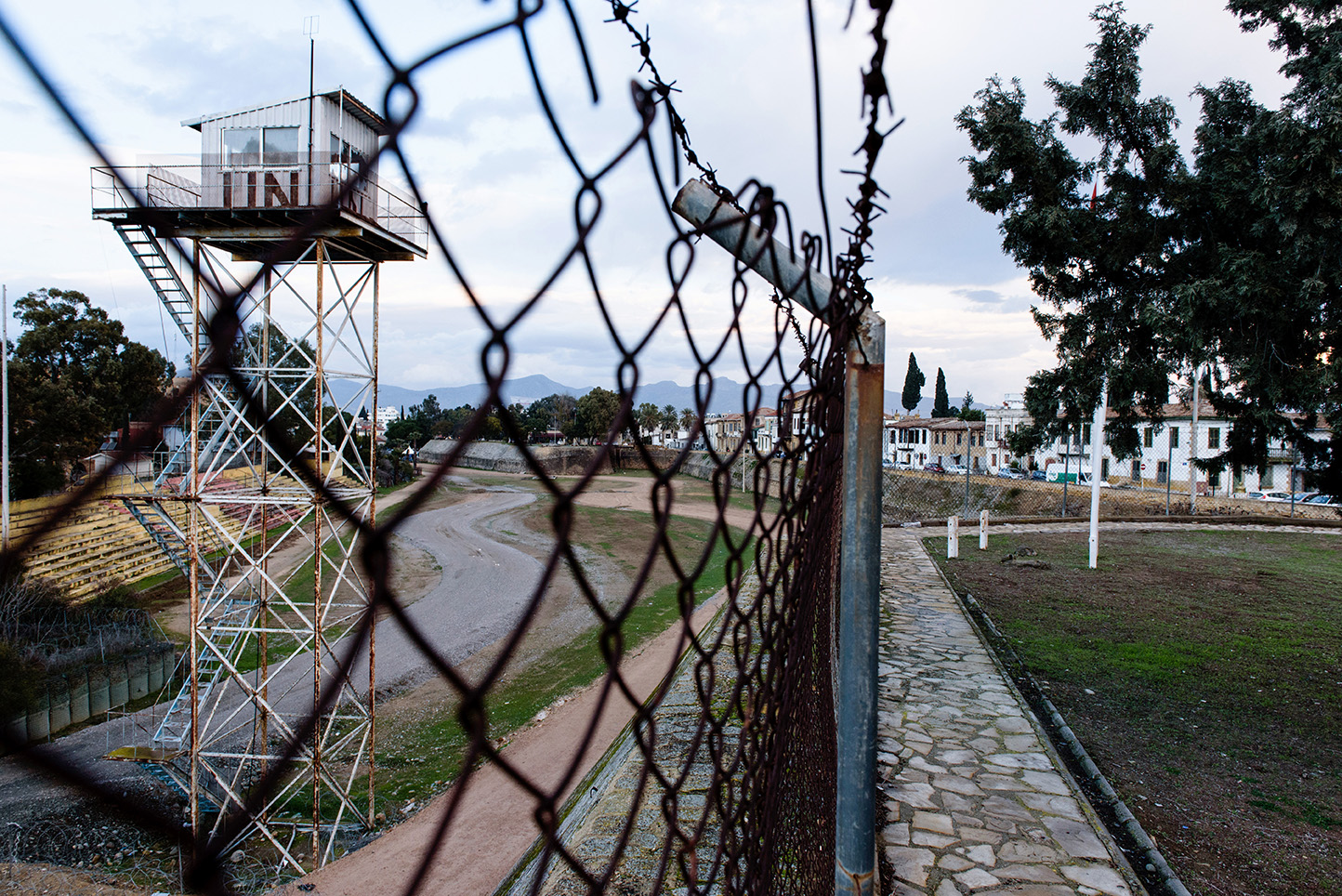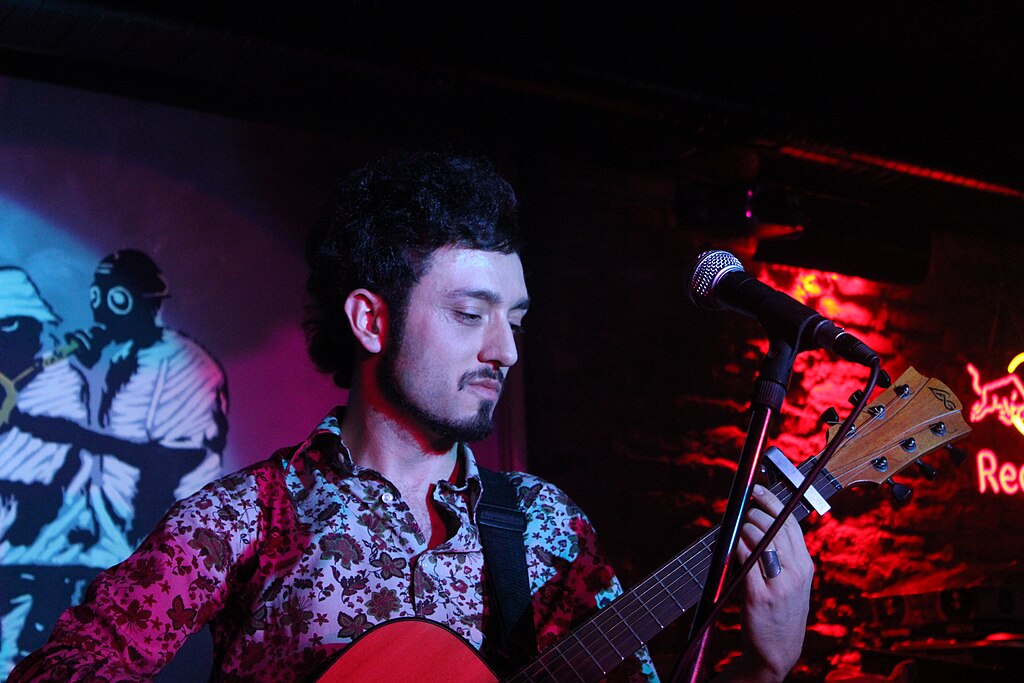Promises, politics, and the Greek community of Istanbul
Erdoğan’s recent public promise to consider reopening the legendary Halki Seminary has revived the historic concerns and aspirations of Istanbul’s Rum community and, in some cases, its support forTurkey’s longest-serving president

shutterstock_1352994728
Theological School of Halki, Istanbul - © OVKNHR/Shutterstock
In an Istanbulite household, secrets are told in the kitchen.
It was the summer of 2023, two months after President Erdoğan’s re-election, when I visited one of my aunts, a woman who has shaped my connection to Istanbul, to its Greek community community and to the Turkish language. In her small kitchen, the cezve – a traditional coffee pot typically made of copper, brass, or stainless steel – on the stove was breathing out the sweet, bitter scent of coffee. Just before she poured it, she leaned towards me and said, almost playfully, almost guiltily, “I voted for Erdoğan. Yes, I did.” Then she smiled in that quiet, knowing way Istanbulites have when justifying something that cannot be fully explained. “He’s been good for us,” she added. “And who knows what the others might do? They could be worse.”
Her words lingered longer than the aroma of the coffee. That single exchange, a confession wrapped in affection, became the spark that led me to question how the Greeks of Istanbul vote, what shapes their political instincts, and why almost nothing has ever been written about it.
An ancient community
The Rum, or Greek Orthodox community of Istanbul, are the descendants of the city’s Byzantine-era Greek population. Historically recognised as a distinct religious and ethnic minority under the Ottoman millet system, they have maintained their own churches, schools, and communal institutions for centuries, contributing significantly to the city’s commerce, education, and cultural life. Merchants, teachers, and professionals from the community have played a visible role in shaping Istanbul’s economic and social fabric, while preserving the Greek language, Orthodox Christian practices, and a distinct cultural identity. Today, though their numbers have dwindled to a few thousand, the Rum continue to sustain these traditions, maintaining a presence that is both historical and actively engaged in the city’s contemporary life.
The way politics is spoken about (or not spoken about) in the Rum community reveals another kind of continuity. There is a scene in Tassos Boulmetis’ iconic film Politiki Kouzina (A Touch of Spice) where young Fanis sits with his grandfather in a hamam, and the older man teaches him how to speak mindfully, choosing words that convey meaning without causing offense. Through this quiet lesson, the film captures a way of communicating that resonates deeply with Istanbul’s Rum community: the art of addressing sensitive topics indirectly, of preserving dignity, and of understanding what can be said aloud and what must remain unspoken.
Hristo Dafnopatidis, now in his thirties, is one of the most active and recognisable faces of Istanbul’s Rum community. A former champion athlete, he works in the shipping industry, yet maintains a private connection to tradition: he often chants during liturgies, a personal practice rather than a public vocation. Hristo’s balanced presence reflects the way the community navigates modern life while quietly sustaining its heritage, a reminder that Rum identity endures in subtle but enduring forms. He talks to OBCT about the Istanbulite Greeks’ unique way of discussing sensitive topics mainly through implication rather than declaration: “There is a long-standing tradition of discretion that shapes our conversations and which has grown into a part of our identity. This is something that I learnt at home as a child; it is a legacy that I will probably pass on to my little daughter, too.”
Dafnopatidis attributes this discretion partly to lessons learnt during times of political turbulence and instability.
“The Greek-Turkish bilateral relations would always have an impact on our community. Especially during the previous decades, every time there was an incident, we would be the first to feel its repercussions. This inevitably creates a shared sense of awareness and a tendency to keep things balanced”.
To speak of Rum politics, then, is to speak of endurance. This is a community that continues to participate in civic life while remaining largely invisible within it.
Sociologists such as James C. Scott have described this phenomenon as “everyday forms of resistance”, that is, quiet acts that maintain dignity without direct confrontation. In a similar way, the Rum community’s political silence functions as both a defense and a dialogue. What is not said is often as meaningful as what is. Anthropologist Michael Herzfeld’s idea of “cultural intimacy” also applies here: a shared understanding of what can be acknowledged among insiders, but never stated publicly.
The result is a mode of civic life conducted in symbols: politics are naturally embedded in gestures, loyalties, and habits rather than open speech. Conversations at church courtyards or name-day tables might hint at approval or skepticism toward the government, yet rarely cross into explicit commentary. This discretion, while born of caution, has become a cultural rhythm of its own.
Votes without voices
Despite the long history and political awareness of Istanbul’s Greeks, there is almost no formal research on how they vote or what drives their political preferences. Studies by Grigoriadis, Taşkın, and others have examined identity and minority rights, but electoral behavior remains uncharted. The absence of data is one more piece of evidence pointing to a social landscape where the boundaries of public expression and private thought are blurred.
Within that silence, impressions circulate. Some members quietly admit to a pragmatic sympathy for Erdoğan, valuing the restoration of churches, protection of foundations, and a sense of stability. Others remain deeply skeptical, wary of what they see as symbolic gestures under a wider diplomatic agenda. The case of the Theological School of Halki is a good example of this ambiguity. For the people of the shrinking Rum community of Istanbul, Halki has come to represent more than theology. It stands for a symbolic recognition, a quiet hope that their existence might again be acknowledged in the city they have never left. Still, the promise of its reopening has been renewed so often that it has become almost generational.
Halki: an eternal promise
Half a century after its closure, the Theological School of Halki remains a landmark for the Greek community. Perched on the pine-covered island of Heybeliada, the seminary once formed generations of clergy and scholars for the Ecumenical Patriarchate. Its forced closure in 1971 marked more than the end of a school; it came to embody the slow retreat of a centuries-old community from public life.
During a meeting held in September 2025, U.S. President Donald Trump asked President Erdoğan to reopen the seminary; a request made after Trump’s Washington meeting with Ecumenical Patriarch Bartholomew. Erdoğan replied that he would “do whatever we can that falls on our part,” later promising to raise the matter with Bartholomew directly.
International relations expert Nicholas Paounis attributes this development to a diplomatic gesture by Erdoğan, aiming to strengthen ties with the United States with the upper goal of reintegrating Turkey into key defense programs.
“The move is part of a wider strategy by Erdoğan to address tensions with the United States, particularly regarding sanctions imposed over Turkey’s purchase of the Russian S-400 system, which barred the country from the F-35 program”, says Paounis, who has been analysing Turkey’s foreign policy over the last years for the Greek media. “By signaling willingness on Halki, Erdoğan positions himself to potentially secure the lifting of sanctions and Turkey’s return to the fighter jet program.”
The Erdoğan-Trump exchange has rekindled cautious optimism among Istanbul’s Greeks.
“For us the real issue is not whether Halki will be re-opened or not, but under what form”, says a community member that prefers to remain anonymous. “We would need Halki to continue being a theological school, so that the Orthodox community can be self-sufficient and not have to ‘import’ clerics from Greece”.
The concern that a landmark monument might be re-offered to the public, but in a different format is a valid one. Recent examples in Istanbul include the conversion of the Agia Sophia (AyaSofya) and the Chora Church (Kariye Museum), respectively, into active mosques. The repurposing of these landmark byzantine monuments has sparked controversy not only for religious reasons connected with Christian heritage, but also for the irreversible architectural damage that might be caused by hundreds of visitors circulating freely and without precaution on a space that needs to be properly preserved.
Promises, politics, and the Greek community of Istanbul
Erdoğan’s recent public promise to consider reopening the legendary Halki Seminary has revived the historic concerns and aspirations of Istanbul’s Rum community and, in some cases, its support forTurkey’s longest-serving president

shutterstock_1352994728
Theological School of Halki, Istanbul - © OVKNHR/Shutterstock
In an Istanbulite household, secrets are told in the kitchen.
It was the summer of 2023, two months after President Erdoğan’s re-election, when I visited one of my aunts, a woman who has shaped my connection to Istanbul, to its Greek community community and to the Turkish language. In her small kitchen, the cezve – a traditional coffee pot typically made of copper, brass, or stainless steel – on the stove was breathing out the sweet, bitter scent of coffee. Just before she poured it, she leaned towards me and said, almost playfully, almost guiltily, “I voted for Erdoğan. Yes, I did.” Then she smiled in that quiet, knowing way Istanbulites have when justifying something that cannot be fully explained. “He’s been good for us,” she added. “And who knows what the others might do? They could be worse.”
Her words lingered longer than the aroma of the coffee. That single exchange, a confession wrapped in affection, became the spark that led me to question how the Greeks of Istanbul vote, what shapes their political instincts, and why almost nothing has ever been written about it.
An ancient community
The Rum, or Greek Orthodox community of Istanbul, are the descendants of the city’s Byzantine-era Greek population. Historically recognised as a distinct religious and ethnic minority under the Ottoman millet system, they have maintained their own churches, schools, and communal institutions for centuries, contributing significantly to the city’s commerce, education, and cultural life. Merchants, teachers, and professionals from the community have played a visible role in shaping Istanbul’s economic and social fabric, while preserving the Greek language, Orthodox Christian practices, and a distinct cultural identity. Today, though their numbers have dwindled to a few thousand, the Rum continue to sustain these traditions, maintaining a presence that is both historical and actively engaged in the city’s contemporary life.
The way politics is spoken about (or not spoken about) in the Rum community reveals another kind of continuity. There is a scene in Tassos Boulmetis’ iconic film Politiki Kouzina (A Touch of Spice) where young Fanis sits with his grandfather in a hamam, and the older man teaches him how to speak mindfully, choosing words that convey meaning without causing offense. Through this quiet lesson, the film captures a way of communicating that resonates deeply with Istanbul’s Rum community: the art of addressing sensitive topics indirectly, of preserving dignity, and of understanding what can be said aloud and what must remain unspoken.
Hristo Dafnopatidis, now in his thirties, is one of the most active and recognisable faces of Istanbul’s Rum community. A former champion athlete, he works in the shipping industry, yet maintains a private connection to tradition: he often chants during liturgies, a personal practice rather than a public vocation. Hristo’s balanced presence reflects the way the community navigates modern life while quietly sustaining its heritage, a reminder that Rum identity endures in subtle but enduring forms. He talks to OBCT about the Istanbulite Greeks’ unique way of discussing sensitive topics mainly through implication rather than declaration: “There is a long-standing tradition of discretion that shapes our conversations and which has grown into a part of our identity. This is something that I learnt at home as a child; it is a legacy that I will probably pass on to my little daughter, too.”
Dafnopatidis attributes this discretion partly to lessons learnt during times of political turbulence and instability.
“The Greek-Turkish bilateral relations would always have an impact on our community. Especially during the previous decades, every time there was an incident, we would be the first to feel its repercussions. This inevitably creates a shared sense of awareness and a tendency to keep things balanced”.
To speak of Rum politics, then, is to speak of endurance. This is a community that continues to participate in civic life while remaining largely invisible within it.
Sociologists such as James C. Scott have described this phenomenon as “everyday forms of resistance”, that is, quiet acts that maintain dignity without direct confrontation. In a similar way, the Rum community’s political silence functions as both a defense and a dialogue. What is not said is often as meaningful as what is. Anthropologist Michael Herzfeld’s idea of “cultural intimacy” also applies here: a shared understanding of what can be acknowledged among insiders, but never stated publicly.
The result is a mode of civic life conducted in symbols: politics are naturally embedded in gestures, loyalties, and habits rather than open speech. Conversations at church courtyards or name-day tables might hint at approval or skepticism toward the government, yet rarely cross into explicit commentary. This discretion, while born of caution, has become a cultural rhythm of its own.
Votes without voices
Despite the long history and political awareness of Istanbul’s Greeks, there is almost no formal research on how they vote or what drives their political preferences. Studies by Grigoriadis, Taşkın, and others have examined identity and minority rights, but electoral behavior remains uncharted. The absence of data is one more piece of evidence pointing to a social landscape where the boundaries of public expression and private thought are blurred.
Within that silence, impressions circulate. Some members quietly admit to a pragmatic sympathy for Erdoğan, valuing the restoration of churches, protection of foundations, and a sense of stability. Others remain deeply skeptical, wary of what they see as symbolic gestures under a wider diplomatic agenda. The case of the Theological School of Halki is a good example of this ambiguity. For the people of the shrinking Rum community of Istanbul, Halki has come to represent more than theology. It stands for a symbolic recognition, a quiet hope that their existence might again be acknowledged in the city they have never left. Still, the promise of its reopening has been renewed so often that it has become almost generational.
Halki: an eternal promise
Half a century after its closure, the Theological School of Halki remains a landmark for the Greek community. Perched on the pine-covered island of Heybeliada, the seminary once formed generations of clergy and scholars for the Ecumenical Patriarchate. Its forced closure in 1971 marked more than the end of a school; it came to embody the slow retreat of a centuries-old community from public life.
During a meeting held in September 2025, U.S. President Donald Trump asked President Erdoğan to reopen the seminary; a request made after Trump’s Washington meeting with Ecumenical Patriarch Bartholomew. Erdoğan replied that he would “do whatever we can that falls on our part,” later promising to raise the matter with Bartholomew directly.
International relations expert Nicholas Paounis attributes this development to a diplomatic gesture by Erdoğan, aiming to strengthen ties with the United States with the upper goal of reintegrating Turkey into key defense programs.
“The move is part of a wider strategy by Erdoğan to address tensions with the United States, particularly regarding sanctions imposed over Turkey’s purchase of the Russian S-400 system, which barred the country from the F-35 program”, says Paounis, who has been analysing Turkey’s foreign policy over the last years for the Greek media. “By signaling willingness on Halki, Erdoğan positions himself to potentially secure the lifting of sanctions and Turkey’s return to the fighter jet program.”
The Erdoğan-Trump exchange has rekindled cautious optimism among Istanbul’s Greeks.
“For us the real issue is not whether Halki will be re-opened or not, but under what form”, says a community member that prefers to remain anonymous. “We would need Halki to continue being a theological school, so that the Orthodox community can be self-sufficient and not have to ‘import’ clerics from Greece”.
The concern that a landmark monument might be re-offered to the public, but in a different format is a valid one. Recent examples in Istanbul include the conversion of the Agia Sophia (AyaSofya) and the Chora Church (Kariye Museum), respectively, into active mosques. The repurposing of these landmark byzantine monuments has sparked controversy not only for religious reasons connected with Christian heritage, but also for the irreversible architectural damage that might be caused by hundreds of visitors circulating freely and without precaution on a space that needs to be properly preserved.









